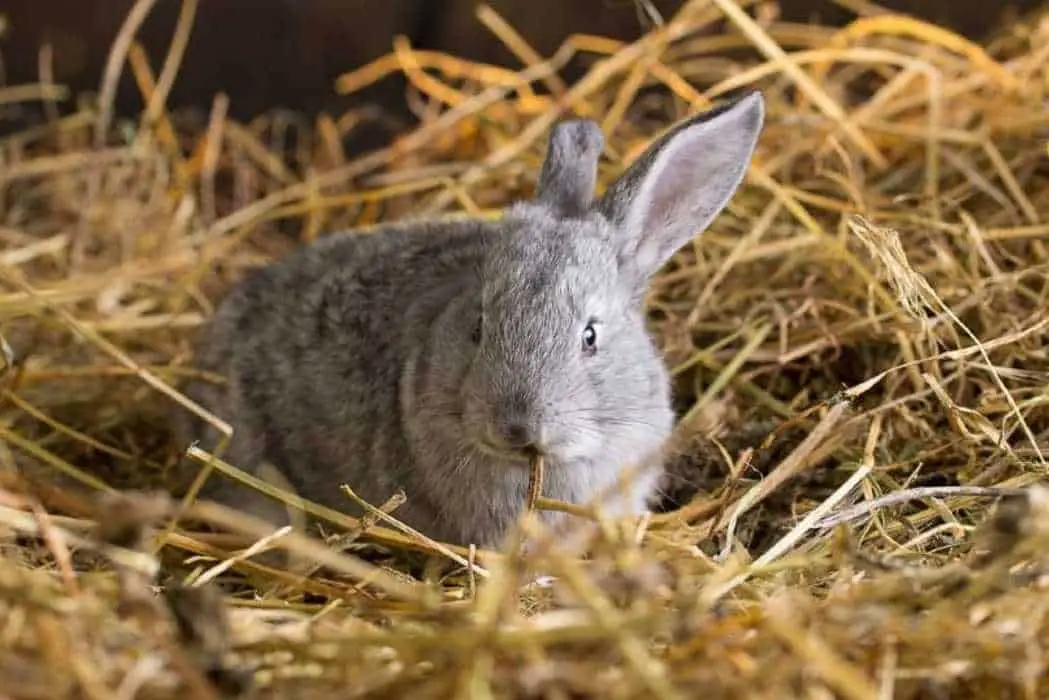Rabbits suffer allergic reactions, just like humans. These allergic reactions could be noticeable bodily changes or modifications in their conduct/action. Symptoms are usually red eyes, restlessness, discharge from the nose, and irritability.
Even though allergies in rabbits are rarely diagnosed and poorly understood, you shouldn’t turn a blind eye once you notice the symptoms in your rabbit. Below are the types, causes, symptoms, and treatments of rabbits’ allergies.
Allergies Caused By Food
Rabbits are herbivorous animals, which means that they can feed on raw food. Their distinctive ability to process fiber and nutrients makes them adaptable to different environments. But this also calls for utmost caution on the part of their keepers when giving them food. Food allergies can be caused by genetics and environmental elements.
In the first few weeks of a rabbit’s life, certain environmental elements may make the rabbit’s immune system vulnerable, making it overreact to some foods.
An allergen can also be any food consumed by the rabbit in the past. Foods that can threaten your rabbits’ health and disrupt their digestive system include dusty hay, pellets, vegetables, and even bunny treats.
Symptoms
These include changes in skin color, incessant sneezes, watery eyes, diarrhea for pellets, constant itching, which leads to fur loss, bloating, ear problems, and an unhealthy coat.
Treatment
Upon noticing any of the symptoms, the first step is to find out which food is the cause of the allergy. You need a vet to carry out a blood test to know which food is causing the allergy.
The vet may instruct that there be a temporary change in the diet of the affected rabbit, introducing a new diet for a few days or weeks, or permanent elimination based on how severe the allergy is.
Usually, the best food for rabbits is an easily digestible meal with many nutrients, such as hay, which also aids in wearing down their ever-growing teeth and keeps their stomachs in check.
Prevention
Also, be careful with feeding your rabbits vegetables like cauliflower, rhubarb, unidentified wild plants, iceberg lettuce, avocado, chocolate, grains, fruit seeds, meat, dairy, beans, garlic, mushrooms, cooked food, potato, onion, and processed food containing gas.
These foods are harmful and can result in indigestion, restlessness, hyperthermia, behavioral abnormality, hemolytic anemia, obesity, swollen mouth, lethargy, organ damage, and several others when consumed by the rabbits.
Allergies Caused By Bedding
An uncommon allergy suffered by rabbits is the bedding allergy. You may wonder how this is a problem, but the sensitivity of rabbits can not be overemphasized. Soiled bedding causes allergic reactions to common allergens, pine and wood chip bedding, newspaper bedding, hay bedding, straw bedding, corn husk, and scented bedding.
Besides, the rabbit’s urine contains high amounts of ammonia, which has an odor offensive to the rabbit’s respiratory system, causing discomfort and irritation. This discomfort can lead to physical and mental stress on the rabbits and compromise their immunity. Beddings that can cause allergic reactions include;
Corn husks
Asides from growing mold, the wispy hair strands and hard cores of corn husks can also cause intestinal blockages if the rabbit ingests them.
Pine and Cedar Bedding
Pine and cedar bedding contains phenols and oils, harmful to the rabbits’ liver and respiratory system.
Clump cat litter
Clump cat litter has a lovely scent; however, it is also full of chemicals that can be fatal if ingested by the rabbit.
Symptoms
These include sore eyes, watery eyes, itching eyes, sneezing, discharge from the nose, and change in the rabbit’s stool due to the pellet bedding allergy.
Treatment
In treating this allergy, clean or change the rabbits’ bedding completely; beddings such as Oxbow bedding, Kiln dried pellet bedding, and Aspen bedding are better replacements. They are dust-free and suitable for rabbits prone to upper respiratory infections.
They are also edible and non-toxic when consumed. For instance, Oxbows rabbit bedding is made from printed natural paper, which is safe for a rabbit to drink since it is almost 100% cellulose, a common nutrient found in vegetables consumed by rabbits.
After the wood pellets are wet, they turn into powder, making them more porous and less prone to molding, and allergy-friendly. Unlike the wood or cedar bedding that few rabbits and some pet owners are allergic to, aspens are wood shavings from logs rather than refined wood products, so they don’t contain toxic substances.
Prevention
Keep the rabbits’ cage or litter box clean and free of odors, and clean bedding at least once a week, if not twice. For house rabbits, allow them to roam around the house. If the rabbit is locked up, change their bedding often to prevent respiratory damage from urine buildup.
Allergies Caused By Environment
Like humans, rabbits are also allergic to their environment, attributed to their unique sense of smell. Cigarettes, strong body spray, fumes, freshener sprays, essential oils, carpet cleaning products, mites and fleas, and artificial solid scents can irritate your rabbits.
Symptoms
These include red eyes, nose discharge, itching, constant touching the face with its paws, inflammation, and rubbing the face. Also, prolonged exposure to pollutants might lead to respiratory infections such as shuffles, respiratory infections, chronic rhinitis, and bronchitis if not treated on time.
Treatment
Remove pollutants from the environment. Avoid smoke inside the home as smoke allergies can cause chronic conditions when not treated early. The vet may administer corticosteroids and antihistamines to manage inflammation.
Prevention
Use a HEPA filter to clean the air ducts to minimize the presence of allergens. Maintain their litter to remove all dust allergens and use scentless detergent and air purifiers to avoid triggering the allergies.
Protect them from temperature changes by housing them indoors in a well-lit, cool, ventilated place between 10 and 25°C, away from direct sunlight, draughts, and radiators. For rabbits kept outdoors, use a blanket or a piece of old carpet to cover their hutch for extra protection on cold nights and sufficient ventilation.
Allergies Caused By Dust
Exposure to dust from the pollen, hay, food, curtains, chemicals at home, smoke, or surroundings can make your rabbits sick.
Symptoms
Dust allergy might lead to itching, watery, red, inflamed eyes, and sneezing.
Treatment
Dust allergy isn’t a serious concern and will leave when the allergen is absent. If it’s serious, take your rabbit to the vet.
Prevention
A clean environment minimizes the discomfort and irritation dust causes to super-sensitive rabbits. When rabbits are indoors, put them in place without carpeted floors.
Research has shown that vinyl, tile, linoleum, or hardwood floors accommodate less dust than carpeted houses. Furthermore, use a vacuum with a double-layered bag to mop the house regularly. Put out dusty curtains and get an air purifier to clean the air.
Allergies Caused By Seasons
Can pet rabbits have allergies to season changes? Yes, they can, although it is usually rare. Also, not all rabbits experience seasonal allergies.
Symptoms
These include sneezing, cold ears, sore eyes, itching eyes, watery eyes, and scratching their furs for the winter allergy. Warm ears and feet, blueness around the mouth and nose, reduced feeding, dullness, unresponsiveness, restlessness, increased breathing rate, and open-mouth breathing for summer allergies.
Treatment
Seasonal allergies aren’t harmful and would typically go away after the season. For winter allergies, put water and vinegar on the itchy ears. If the temperature inside the hutch is too cold, adding extra bedding for insulation and provision blankets would help keep the rabbit warm, relieving it of its allergies.
For summer allergies, remove rabbits from places within 85° Fahrenheit. Wet their ears to keep them cool, feed them wet vegetables to keep them hydrated, and brush any loose fur from their coats.
Prolonged exposure to summer allergy may lead to heatstroke. However, if symptoms persist, it is best to go to a veterinary doctor for consultation.
Prevention
In winter, rabbits shouldn’t be placed in rooms below 20 degrees. Hence, young rabbits, old rabbits, those with medical conditions, and rabbits accustomed to living indoors shouldn’t be placed outside in winter. Outdoor rabbits should be housed together and provided with good nutrition in a moisture-free hutch.
During summer, provide shade for the rabbits. Place iced water on the rabbit’s bedding and put fans in the rabbitry. Provide your rabbits with clean, cool water and a rich diet. Also, place them in a cool spot in the house.
Allergies Caused By Insects
Exposure to insects such as fleas, mites, lice, and ticks from cats and dogs can make your rabbits sick.
Symptoms
Insects allergy may lead to dull hair coat, discomfort, itchiness, shaking of the head, and anemia. It is harmful, and prolonged exposure can result in hearing loss for the rabbit.
Treatment
Use a flea comb to remove fleas from the rabbit’s fur. Apply selamectin on the skin located at the back of the rabbit’s head to kill the fleas. Treat your rabbits with cortisol for mites and fleas; fipronil should not be used on a rabbit.
Isolate the affected rabbit as insect allergy is contagious and can spread from one rabbit to another by direct contact. You can also use a pair of tweezers to pull the tick off the rabbit’s skin. See the vet for more assistance.
Prevention
Keep your bunny’s environment clean. From time to time, you can spray it with insecticide to discourage insects from sticking around. Also, treat your rabbits properly. If you have other pets, take care of them properly and minimize their contact with your bunnies.
Summary
Can bunnies have allergies? Yes, they can. It’s left to you to find the source to minimize the impact. Also, put in place preventive measures to forestall any recurrence. Some allergies might cause severe health issues when ignored.
Whether caused by food, bedding, or environmental irritants, take the necessary action when allergies appear. Don’t forget to visit the vet for professional assistance.




